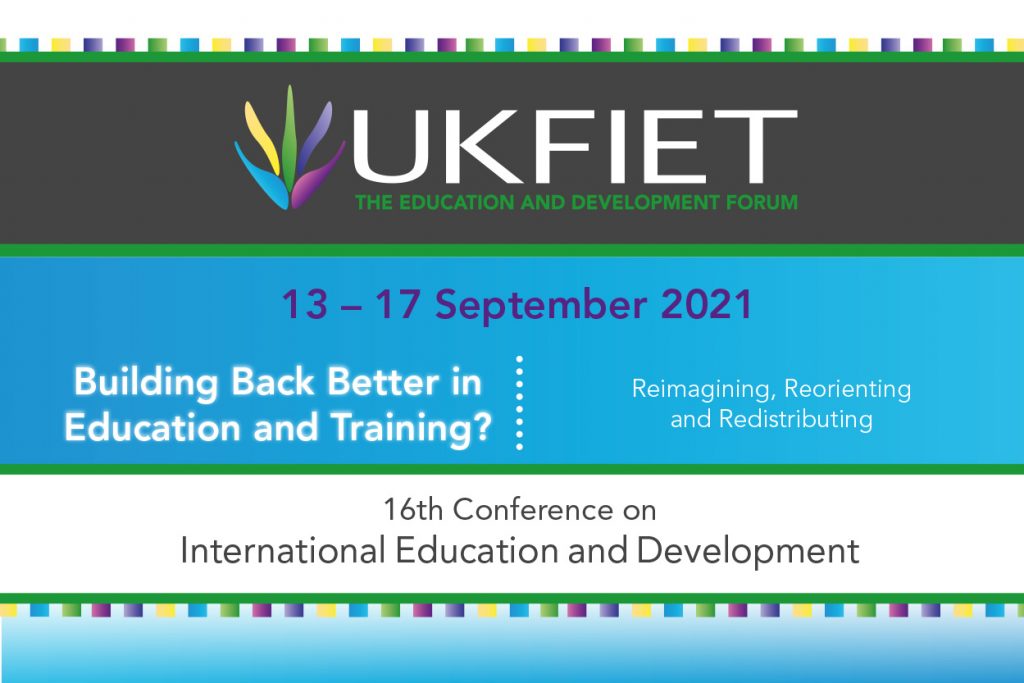
As schools reopened after the pandemic, education initiatives have had to assess the impact of COVID-19 on learning, marginalisation and wellbeing. The slogan ‘build back better’ suggests an attempt to address some of the harmful effects of the many global, national, local and household inequalities exposed by the COVID pandemic. AGEE coordinated a symposium at the UKFIET Conference in September 2021 to examine these issues.
Gender as a focus for work frames this problem in ways that open up many compelling issues. The pandemic has highlighted the significance of pre-existing exclusions and discrimination and brought attention to new kinds of vulnerabilities and interconnections, prompting consideration of crisis, complexity and care associated with education. These can be difficult to measure, and are often discursively associated with constructing and maintaining inequalities. This has prompted a need for a reconsideration of programmes, indicators, and alliances; and for work to acknowledge the complexity of understanding gender inequality and equality in education to support policy, planning and practice associated with ‘Build back better’.
In order to learn from the last year, a number of critical reflections are needed in order to design approaches and activities that genuinely ‘build back better’ and more equitably, and the papers in this symposium address a number of these. First, a focus on data and indicators: how can we ‘build back better’ if we do not fully describe and understand the ways in which intersecting inequalities have been created and sustained in and through education both before, during, and after the pandemic? Finely tuned approaches to planning, participation, measurement and critical reflection are needed to support practice that equitably redistributes education opportunities and outcomes, and reimagine the processes to realise this. Second, through examining the detailed experiences in specific contexts, there is a need to explore the realities faced by projects, particularly in terms of the immediate challenges brought by the pandemic to pedagogy and learning; and reflecting on what needs to be taken forwards in the next stages.
In the first, conceptual paper, academics associated with the AGEE (Accountablity forGender Equality in Education) project discussed ways they have considered the effects of COVID and the implications of care, inequality and complexity for thinking about gender issues in education. Elaine Unterhalter, Lebo Moletsane, Helen Longlands, and Rosie Peppin Vaughan reflected on the different and mutable meanings of care, the incorporation of these together with complexity and crisis into a dashboard of gender indicators they have developed for the AGEE project drawing on the capability approach, with reflections on intersecting inequalities in the context of rural locales in South Africa and the challenges for monitoring these raise.
Second, Justine Sass shared findings from UNESCO’s global study on the gendered impact of the COVID-19 school closures, including gender-responsive measures to ensure continuity of learning, transform education systems, prioritise resilience and address the key bottlenecks and barriers to girls’ education or – as coined by UNESCO – to “build back equal”.
The second half of the symposium featured interactive presentations from two projects in the Girls’ Education Challenge. The first, by Anne Kabade from the Aga Khan Foundation discussed adapting learning modalities for marginalised girls in hard to reach areas of Afghanistan during the pandemic. The second by Joy Khangati and Sarah Amato (CARE, Somalia) presented findings around what works for those facing multiple crises and how COVID-19 exacerbated the already extreme impact of conflict and natural disasters, further marginalising girls and students in conflict affected areas. Both presentations continued the theme of improving information and understanding of how COVID has affected gender inequalities in education, these two papers explored experiences within initiatives around what needs to be built back better; what has been learnt from the pandemic; and what needs to be taken forwards.
Chair: Sharon Tao / Emma Sarton
Paper 1 – Elaine Unterhalter, Helen Longlands & Rosie Peppin Vaughan (University College London) Relebohile Moletsane (University of Kwazulu-Natal) Complex systems under conditions of crisis and vulnerability in South Africa: considerations for measuring gender, care and capabilities in education to build back equal
Paper 2 – Justine Sass (Chief, Section of Education for Inclusion and Gender Equality, UNESCO) Addressing the gender dimensions of the covid-19 school closures: findings from Unesco’s global study
Paper 3 – Anne Kabade (Aga Khan Foundation), Adapting learning modalities for marginalised girls in hard to reach areas of Afghanistan during the pandemic
Paper 4 – Joy Khangati and Sarah Amato (CARE, Somalia) What works for those facing multiple crises: how COVID-19 exacerbated the already extreme impact of conflict and natural disasters
